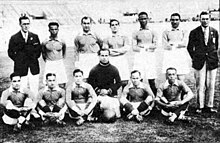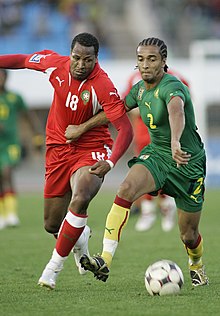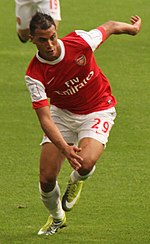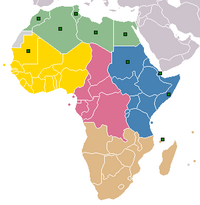Portal:Football in Africa
Introduction
Football is the most popular sport in Africa, alongside basketball. Indeed, football is probably the most popular sport in every African country, although rugby and cricket are also very popular in South Africa. The first football stadium to be built in Africa was the Alexandria Stadium in 1929.
The English Premier League is the most popular sports league in Africa. The most popular clubs in Africa are Arsenal, Chelsea and Manchester United. (Full article...)
This section may be unbalanced toward certain viewpoints. (October 2022) |

Selected article -
The African Nations Championship, known for sponsorship purposes as the TotalEnergies African Nations Championship and commonly abbreviated as CHAN, is a biennial African association football tournament organized by the Confederation of African Football (CAF) since 2009 and first announced in September 2007. The participating nations must consist of players playing in their national league competitions.
The DR Congo and Morocco are the most successful teams in this tournament with two titles each, followed by Tunisia, Libya and incumbent champions Senegal with one title each. The tournament began life in 2009 with 8 teams, which was doubled for the 2nd edition up until the 6th and is currently contested by 18 teams since the 2022 edition.
Since the 2014 edition, matches of every edition of this tournament from qualification to the final will be computed to calculate the forthcoming FIFA World Rankings following its conclusion, which CAF exclaimed at the time as an important step for the competition's development. At the time, FIFA considers the tournament friendly since it is restricted to players from local leagues to participate. The tournament is held biennially and alternates with the Africa Cup of Nations.
Selected biography -
Chamakh started his career training throughout various clubs in the Aquitaine region. In 2000, he signed with Bordeaux. Chamakh made his professional debut for the club in the 2002–03 season. He spent nine years at the club and helped Bordeaux win the Coupe de la Ligue in 2007. In the 2008–09 season, Chamakh won his first league title as Bordeaux were crowned champions for the first time since the 1998–99 season. The club also won the Coupe de la Ligue completing the league and league cup double. In May 2010, Chamakh joined Arsenal of the Premier League on a free transfer after agreeing to a four-year contract with the club. In October 2010, Chamakh became the first player in UEFA Champions League history to score in six consecutive matches.
Although born and raised in France, Chamakh chose to play international football for Morocco, because he had Moroccan parents. He made his national team debut in July 2003 and has played at three Africa Cup of Nations tournaments, including the 2004 tournament in which Morocco finished runner-up. In August 2010, he captained the national team for the first time.
Selected image -
 |
Members of a 1960s Ghana national team pose with some of their trophies. The Ghana national team has won the Africa Cup of Nations four times, and is one of only three African teams to have ever reached the quarter-finals of a FIFA World Cup finals.
Subcategories
Related portals
More sports portals
WikiProjects
Related task forces and sub-projects
African football task force
WikiProject Africa • WikiProject Football
WikiProject Football task forces and sub-projects
 | |
| Wikipedia ads | file info – #250 |
Topics
Open tasks

- Expand stubs: Competitions in Africa • Organizations
- Expand club articles of teams from Africa.
- Expand biographies of Africans involved in football.
- Create: Requested articles • Most wanted football articles • Requested general football articles
- Add: Infoboxes • Images (General requests, Requested images of people)
- Review: articles currently under review
- Assess: Assessment requests • Assess an article
- Revert vandalism on this portal and on African football articles
- Assist in maintaining this portal and keeping its selected content up to date.
- WikiNews: Create and submit news stories about African football for Wikipedia's sister project WikiNews.
Associated Wikimedia
The following Wikimedia Foundation sister projects provide more on this subject:
-
Commons
Free media repository -
Wikibooks
Free textbooks and manuals -
Wikidata
Free knowledge base -
Wikinews
Free-content news -
Wikiquote
Collection of quotations -
Wikisource
Free-content library -
Wikiversity
Free learning tools -
Wiktionary
Dictionary and thesaurus
More portals
Sources

- ^ "The History Of Soccer In Africa". NPR.org. 2010-06-09. Retrieved 2016-03-31.
- ^ a b c Alegi, Peter (2010). African Soccerscapes. Ohio University Press. pp. 1–2. ISBN 9780896802780.
- ^ Frimpong, Enoch Darfah. "Ghana news: A world of superstition, frustration and disillusionment - Graphic Online". Retrieved 23 September 2017.
- ^ Lacey, Marc (8 August 2002). "Kangemi Journal; For Spellbinding Soccer, the Juju Man's on the Ball". The New York Times. NY Times. Retrieved 2016-03-31.
- ^ "World Cup Witchcraft: Africa Teams Turn to Magic for Aid". National Geographic. Archived from the original on July 10, 2006. Retrieved 2016-03-31.
- ^ Andy Mitten (September 2010). The Rough Guide to Cult Football. Rough Guides UK. ISBN 9781405387965. Retrieved 2016-04-02.
- ^ "African Nations Cup overshadowed by hocus pocus | Football". The Guardian. Retrieved 2016-04-09.
- ^ Kuper, Simon (2006). Soccer Against the Enemy: How the World's Most Popular Sport Starts and Stops Wars, Fuels Revolutions, and Keeps Dictators in Power. Nation Books. p. 123. ISBN 978-1-56025-878-0.

























